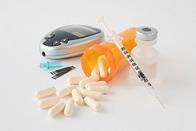Advertisment
Diabetes and advanced breast cancer linked

by Bruce Sylvester: Diabetes and advanced stage breast cancer appear to be linked and diabetic women need better screening, Canadian researchers reported online on March 24, 2015 in the journal Breast Cancer Research and Treatment.
“Our findings suggest that women with diabetes may be predisposed to more advanced stage breast cancer, which may be a contributor to their higher cancer mortality,” said lead investigator Lorraine Lipscombe, MD, a scientist the Institute for Clinical Evaluative Sciences (ICES) and Women’s College Research Institute at the University of Toronto in Ontario.
Lipscombe and associates evaluated data pertaining to stage of cancer at diagnosis of about 38,000 women, ages 20-105 years, who were diagnosed with invasive breast cancer between 2007 and 2012.
The analysis disclosed that 6,115 (15.9 per cent) had diabetes.
Notably, the investigators found that subjects with diabetes were significantly more likely to present with advanced stage breast cancer than non-diabetic subjects.
Diabetic subjects were 14 per cent more likely to present with Stage II breast cancer, 21 per cent more likely to present with Stage III breast cancer, and 16 per cent more likely to present with Stage IV than to present with Stage I.
Subjects with diabetes also had lower mammogram rates, which could account in part for the for later stage disease, the authors said.
Notably, the women with diabetes also had a higher risk of lymph node metastases and larger tumors than women without diabetes.
“In addition, the risk of advanced stage breast cancer was greatest in younger women and those with longer-standing diabetes,” said Lipscombe.
The researchers reported that the majority of diabetic subjects presented with Stage II or III cancer, translating into a 15 per cent decrease in five-year survival from the time of cancer diagnosis, compared to a Stage I diagnosis..
The researchers concluded that breast cancer screening and detection practices should account for existing diabetes and be modified to lower the risk of later-stage detection.





